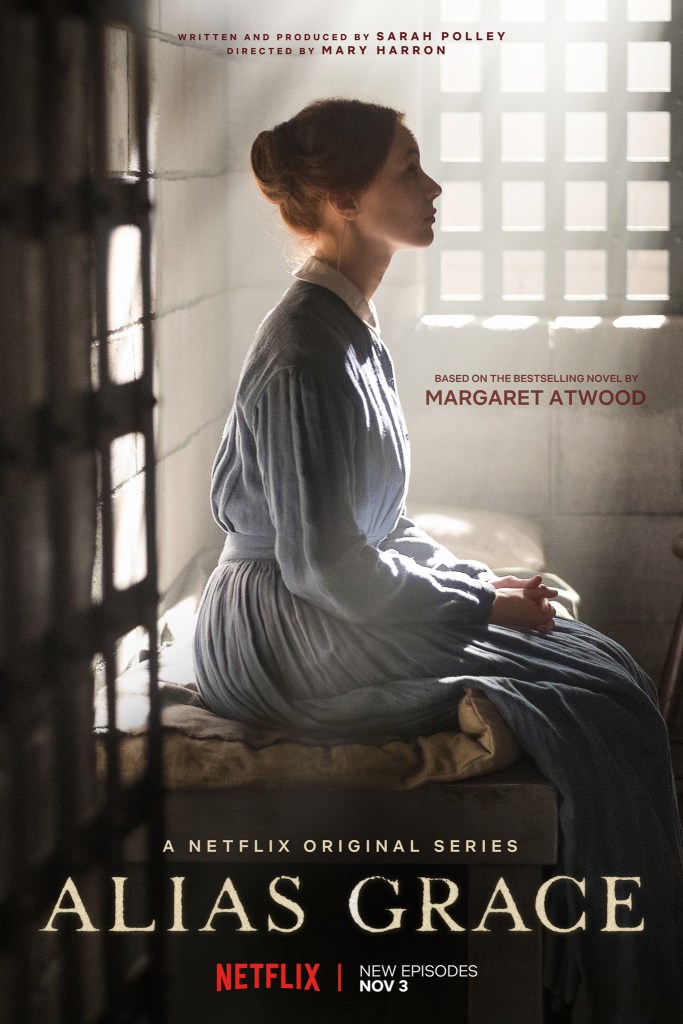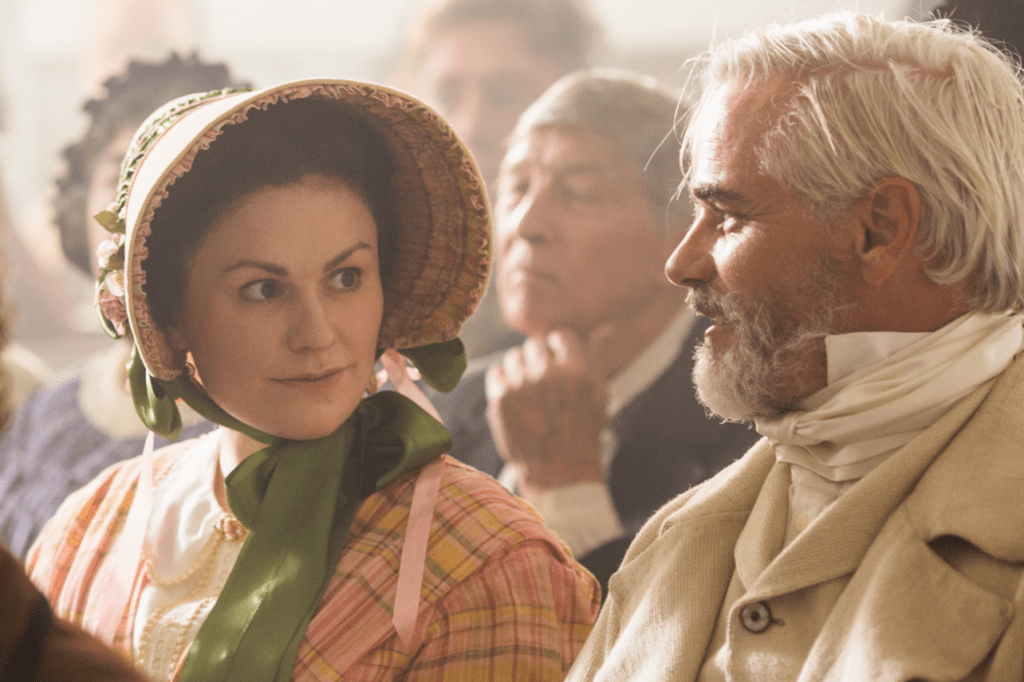I don’t love TV series. If I have to keep up with a big plot arc, it’s not for me. I got through a couple of seasons each of Orange is the New Black and The Walking Dead before I gave up. It’s hard to care about fictional characters in the same basic situation for several actual years. Netflix has made things worse; if I binge watch a show, the next season doesn’t come out for 12 months, and I’m lost when it’s finally on screen.
Margaret Atwood’s famous novel Alias Grace is adapted for screen by highly talented Sarah Polley, and comes in at 6 episodes (no more!), each about 45 minutes long. That I could do! The haunting series captured my interest as I learned a fictionalized version of the actual murderess Grace Marks, who was an Irish immigrant who traveled with her family to Canada in the 1840s, where they were promised a better work situation.

When I picked up Atwood’s book, I was surprised to learn how closely Sarah Polley stuck to the 552-page novel. I love when this happens! Sometimes I just want to see a book come to life and not a director’s interpretation of a work.
The novel begins with Grace Marks in prison. On July 24, 1843, Grace Marks (age 16) was accused of double murder. She spends decades incarcerated, at times in a penitentiary and for a while in a “lunatic asylum.” Many people have interviewed her over the years, but now Dr. Jordan has arrived. He’s not a doctor that cuts people, Grace learns, but a doctor of the nerves and mind. He wants to hear her story to determine if Grace can remember, not to discover if she’s innocent. An entire committee of do-gooders surround Grace and work to have her sentence overturned, and it is they who brought in Dr. Jordan, hoping his findings will help their cause.

On its surface, this is a novel that teases readers with clues as to Grace’s innocence or guilt. Atwood is relentless. Such lines as the following raise red flags: Confronting a sassy rooster, Grace tells the creature, “Mind your manners or I’ll wring your neck. . . although in fact I could never bear to do anything of the sort.” How odd, I think, that one murder victim was strangled! And there are several mentions of Grace making the story more “colorful” to please Dr. Jordan. After he brings her a radish, and she consumes the fresh produce delightedly, she thinks:
Because he was so thoughtful as to bring me this radish, I set to work willingly to tell my story, and to make it as interesting as I can, and rich in incident. . .
A reader can spend the whole book wondering if he/she will grab some clue that finally determines Grace’s truth, but as Alias Grace is based on a true crime that never fully unearthed Grace’s story, Atwood would have to either determine Grace’s innocence or guilt without proper evidence, or lead us on a psychological adventure. She chose the later, which makes the novel an interesting read. You can’t help but change your mind about Grace’s story every couple of chapters.

Deeper down, this a novel about women navigating society. Grace recalls an alcoholic father who hits his wife and children. Once he throws Grace out of the house shortly after their arrival in Canada, she finds work as a live-in domestic servant and must navigate the sexual advances of nearly every man she encounters. Several times, Grace describes blocking her door at night to prevent the young man of the house from coming in to assault her. It’s a story of privilege that doesn’t feel too distant in the #MeToo movement.
Dr. Jordan — and this reader, I must confess — lean in as Grace describes man after man pawing at her and calling her a whore for refusing them. Both Dr. Jordan and I are making connections between unwanted, incessant sexual advances and murder. The people she murdered? Mr. Kinnear, who owns the house in which she worked, and the head servant, Nancy, who is obviously the man’s pet and lover. They flaunt their relationship in front of Grace, and you can make guesses as to why she murdered them, if indeed she did.

One of the first homes in which Grace is placed to work is where she meets her new best friend, Mary. You get a feeling like when Anne Shirley and Diana meet in Anne of Green Gables: it’s meant to be and it’s an unbreakable bond. That is, until Mary realizes she is “in the family way” and cannot persuade the man who promised to marry her to follow through. Readers realizes quickly he is the young mister in the house, a rich college playboy who felt he was just having a romp with the hired help, and what does it matter if he gives her a small gold ring and a false promise to get into her bed. There is a connection between what best friend Mary suffers and the murdered Mr. Kinnear and Nancy: the ending must be equal when the sin is the same.

One man readers are meant to trust is Dr. Jordan, who is a good listener. But between chapters that Grace narrates are sections in third-person limited that follow Dr. Jordan. We learn he solicited a number of prostitutes while he studied in Europe and has sexual thoughts about Grace — his patient! There is a whole tangle of complications that Dr. Jordan brings upon himself with his landlady whose husband has abandoned her, too. I cannot help but think that Dr. Jordan is the same kind of nasty man who may try to get into Grace’s room at night if she were his servant. He appears to be the same kind of “gentleman” who abandoned friend Mary after she became pregnant, so how much can we trust him? Being unable to trust anyone makes the story compelling.
After a while, I felt that the book was captured so well in the TV show that I was convinced I could have skipped the novel. However, the chapters have clips of newspaper articles about the real Grace Marks and selections from a Ms. Moody, who interviewed the real Grace and wrote a book. Then ending, too, gave a better sense of what Grace was feeling than the TV show did, and I was glad for that. It comes full circle when another man asks her to describe the abuse she’s suffered, leaning in when she gets to the pawing would-be rapists. You’re left wondering what will happen to him, if anything, and if he can be trusted.
Overall, enjoy the TV show and the book! I recommend both.

I loved both as well! Great review – makes me want to reread/rewatch.
LikeLike
Did you read the book or see the TV show first? Did that impact how you experienced the other work? I know for me I saw the show first, so I had a clear sound in my head when Grace narrated. I had that Irish accent down. I also couldn’t help but see Anna Paquin when I thought of Nancy.
LikeLike
I didn’t see the series – it may not have been shown here on free-to-air – but I remember loving the book. That, The Handmaid’s Tale, and The Blind Assassin are my favourite Atwoods. Your description here has brought much back, but I’m afraid not enough for me to engage in a meaningful discussion – for which I am sorry.
LikeLike
Hi, Sue! The other Atwood novels I’ve read are the MaddAddam trilogy (and I especially enjoyed the first, Oryx & Crake) and also Cat’s Eye, which I felt was a terrible waste of time. Perhaps Atwood feels that all novels must be very long, whether she’s developed a plot to support the length or not.
LikeLike
Thanks, Melanie. I haven’t read the MaddAddam trilogy, though I have the first two here – somehow I resist them. I don’t leap to speculative fiction, though I did love The Handmaid’s Tale and a few other spec fiction classics. I just keep finding excuses to read other books I really want to read. I’ve read a few other Atwoods including Cat’s Eye, The Robber Bride, and a very early one, Bodily Harm. I don’t love Cat’s Eye as much as others do, but wouldn’t quite call it a waste of time. It’s behind my favourite three! If you haven’t read The Blind Assassin, I’d recommend it.
LikeLike
Atwood’s oeuvre is so extensive I feel like I could focus on her books on my blog for a whole year.
LikeLiked by 1 person
Glad to hear the book lived up to your enjoyment of the TV show! I really must try some more Atwood.
LikeLike
Which Atwood novels have you read? I was really let down by Cat’s Eye last year, but I love the MaddAddam trilogy and taught the first book, Oryx & Crake, when I was still professing.
LikeLike
Ive only read The Handmaid’s Tale so far. I’ve heard good things about the MaddAddam trilogy!
LikeLike
I’m so glad you liked this! I’m the same way when it comes to Netflix-I can’t remember a bloody thing about the season I binged a year ago (probably because we read so many books in between!) so I’ve lost interest in a few stories. So Alias Grace appealed to me because I knew I could watch six epsiodes and be done with it. I also feel a bit more ‘high brow’ when I watch something based on a book rather than, say a reality show or something.
LikeLike
You know whats funny is on the morning news they were talking with this couple who had been married for 15 years and had two kids. I was like, who are these people? Turns out they were the original Bachelorette show–and they’re still together! So, maybe reality TV does count for something, LOL.
LikeLiked by 1 person
whoa! No wonder that’s newsworthy, most bachelor couples break up don’t they? LOL
LikeLike
I thought it was all just shenanigans. I’ve seen Rock of Love with Brett Michaels a time or two.
LikeLiked by 1 person
Oh yes, I recall that show from awhile ago…
LikeLiked by 1 person
Excellent comparison of the book and the series. I want both now. I thought oh finally Dr Jordan is someone Grace can feel safe with…NOT. You’ve convinced me now that the ship shouldn’t get in the way of reading this one. 😆
LikeLike
The ship scene is about a chapter long and not as bad as Kunta’s journey, though it has several of the same descriptions of people throwing up and getting sick, the lack of air and dropping dead bodies off the side.
LikeLike
Excellent dual review of the series and novel! You’ve piqued my curiosity about both. Also, wonderfully phrased: “It’s hard to care about fictional characters in the same basic situation for several actual years.” I have exactly the same trouble with most tv series, unless the writing/dialogue is really strong.
LikeLike
At some point, don’t you just not care that Piper is still in prison? She seems petty after a while. Or Rick Grimes. He could die and I would be okay with that because, dude, how long should one person struggle with the same tired fight?
LikeLiked by 1 person
I haven’t watched much TV for years and none at all recently and yet there was a time when I was totally involved in long running series. I’d say The Bill but I’m not sure it made it across the Atlantic. My experience is that film never matches the visualisation I get from reading, and I prefer to see film and book as different retellings of similar stories rather than one illustrating the other.
LikeLike
I’ve never heard of The Bill, so I’m not sure it made it over. I will say that Alias Grace the show follows the book so dedicatedly that it simply heights the experience, much like reading and watching Rebecca by Daphne du Maurier and Alfred Hitchcock.
LikeLike
[…] Alias Grace by Margaret Atwood: several readers were interested in my progress on Atwood’s novel, either because they loved the show or the book. While I was bored in the middle only because I saw the show and it was so similar to the book, I did enjoy the ending, which gave more of Grace’s perspective than the Netflix series. […]
LikeLike
I love, love this book. So much so that it doesn’t even bother me that there’s no answer given to us about Grace’s guilt or innocence (normally this would drive me crazy). And I’m very encouraged to hear the mini-series follows it closely – yay! I still have it to look forward to!
LikeLike
They make a bit more of the college boy who stays home ill and then starts frolicking with the hired help, which is how Mary ends up “in trouble,” and I appreciated that. Nancy is played by Anna Paquin, whom I don’t love. In real life, she’s a lovely woman, but in every movie she looks like she just had a stroke — and I don’t understand how that’s her “acting face.” Basically, my complaint is that her face does not match the emotions it seems like her character should have.
LikeLiked by 1 person
Now I’m going to be watching for that – haha!
LikeLiked by 1 person
I’m going to have to watch the series. Normally I’m a strict “the book is better” kind of girl, but this one looks great!
LikeLike
I don’t think you’ll be disappointed. Let me know what you think!
LikeLike
I haven’t finished watching the series (which I started at the end of Margaret Atwood Reading Month last year but then my partner wanted to watch too and we’ve gotten distracted by other shows). We’ve started watching shows weekly rather than binge-watching and it’s much more enjoyable, with a few exceptions, like “Russian Doll”, which beg to be binged. But the first two episodes I saw of AG, I really thought were fine fine fine.
How skillfully she slips glimpses of memory/imagination into the story proper: how many doubts are raised in the process when we cannot tell for certain what she is recalling and what she is visualizing based on what someone else is saying. Love it. But, ultimately, yes, I prefer the detail and the reverberations in the novel: so many threads to tug at. And the dimensions you mention, regarding the doctor for instance, and his messy relationship with his landlady (ahem). So. Good.
LikeLike
I felt that the letters Dr. Jordan sent to a guy who knew what he was in college (can’t remember his name now) said a lot about who Dr. Jordan is. He admits his weaknesses and faults to this other man, and I don’t remember actually reading a response from him. We also don’t see much of Dr. Jordan’s mother when she deal with the landlady who keeps writing. That was an interesting part of the book that really demonstrated how alike Dr. Jordan is to some of the men Grace encountered, and made me not trust him, whereas the TV show makes him see flawed, but basically good. He’s too interested in Grace (the show suggests he feel sexual arousal when he thinks about her), but overall seems….okay? Yeesh, writing all this makes me think I’ve lowered my standard for good men.
LikeLike
It’s been several years since I last read Alias Grace so I feel like I could watch the mini-series and still be surprised by it. Glad to hear it’s worthwhile!
LikeLiked by 1 person
I am not a fan of TV series either. But for Alias Grace I will make an effort to see this.
LikeLike
I hope you’ll let me know what you think! It does follow the book closely.
LikeLike
I very rarely watch TV, so I had no idea Netflix adapted this book!!! I haven’t read it yet, but it sounds like I should read the book first, then watch the adaptation. Did you read it in print form? or listen to the audiobook?
LikeLike
I read the print book. Honestly, I think you could watch the show and get 95% of the same experience as the book. If you don’t want to put the time into a chunky tome, here’s your chance to avoid it!
LikeLike
I read this book years ago and don’t remember much about whether I liked it or not, but I have to watch the series now after reading your review!!
LikeLike
It’s a limited series, so you can actually watch it and not have to wait a whole year for the next season. I love that.
LikeLiked by 1 person
Me too!!
LikeLike
This sounds like a great book & Netflix series! I’m a big fan of Sarah Polley – I grew up watching her in the show Avonlea, so I’m always curious to see what she’s up to. I haven’t read any Margaret Atwood yet, and her books always sound so interesting! I love it when there’s a faithful adaptation, and you’ve made this sound very promising! 🙂
LikeLike
Although I never do this, I would argue that you could watch the Netflix show and skip the book, if you’re pressed for time (it IS a big book). They’re very close.
LikeLike
[…] the novel in a college literature course), I dragged my brain begrudgingly through Cat’s Eye. Alias Grace was good, but I read it right on the back of watching the wonderful limited series on Netflix, so […]
LikeLike